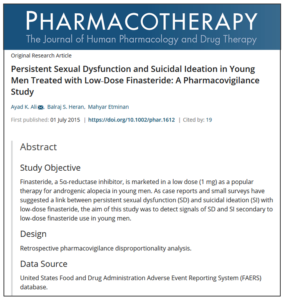SOMERSET, N.J., July 23, 2015 – New research in a leading pharmacology journal concludes that young men who take finasteride for hair loss may be at risk of contemplating suicide.
The study, published in the July issue of Pharmacotherapy and titled “Persistent Sexual Dysfunction and Suicidal Ideation in Young Men Treated with Low-Dose Finasteride,” analyzed 4,910 adverse-event reports involving low-dose finasteride use among men 18 to 45 years old that were submitted to the U.S. Food and Drug Administration between 1998 and 2013.
 Researchers found that 11.8% of those reports (577 cases) involved persistent sexual dysfunction (SD) and 7.9% (39 cases) involved suicidal ideation (SI).
Researchers found that 11.8% of those reports (577 cases) involved persistent sexual dysfunction (SD) and 7.9% (39 cases) involved suicidal ideation (SI).
“Approximately 60% of the SD events were serious in nature, corresponding to disability (43.5%), required intervention (18.3%), hospitalization (9.9%), life-threatening events (5.5%), and patient death (1.7%),” they report. “Among men who experienced SD and SI, 88% of the SI events were serious (disability [36.7%], hospitalization [20%], life-threatening events [16.7%], and required intervention [13.3%]).”
“Persistent [sexual dysfunction] might be a potential risk of low-dose finasteride for androgenic alopecia therapy in young men, and this risk might contribute to [suicidal ideation],” concludes the study’s lead author, Ayad Ali, a pharmacoepidemiologist in the Global Patient Safety division of Eli Lilly and Company.
“Our findings provide a strong hypothesis for pharmacoepidemiologic studies to further examine this association.”
“This study is further evidence that finasteride most likely plays a role in not only devastating sexual health in a subset of otherwise healthy men, but in some cases leads to suicide,” added PFS Foundation CEO Dr. John Santmann. “It’s critical that health care professionals be aware of the numerous risks when considering finasteride therapy for patients.”
PFS has been reported to occur in men who have taken the prescription drug finasteride to treat hair loss (under the brand name Propecia and generics), or enlarged prostates (Proscar and generics).
Reported symptoms include loss of libido, erectile dysfunction, depression, suicidal ideation, anxiety, panic attacks, Peyronie’s disease, penile shrinkage, gynecomastia, muscle atrophy, cognitive impairment, insomnia, severely dry skin, and tinnitus. The condition often has a life-altering impact on victims and their families, such as job loss and the breakup of marriages and romantic relationships.
In March 2015, the U.S. National Institutes of Health listed PFS on its Genetic and Rare Diseases Information Center, noting that “some patients who have taken finasteride have referred to side effects such as sexual dysfunction and depression (sometimes severe)… Studies sponsored by the NIH and other organizations are underway to better understand the effects of 5-alpha reductase inhibitor drugs.”
Three months later, a study published in the Journal of the American Medical Association (JAMA), found that, of the 34 clinical trials conducted on finasteride, none adequately reported on sexual side effects.
“People who take or prescribe the drug assume it’s safe, but there is insufficient information to make that judgment,” said the study’s lead author, Steven Belknap, of the Northwestern University Feinberg School of Medicine.
Also in June, a study published in Hormone Molecular Biology and Clinical Investigation showed that finasteride increases the severity of erectile dysfunction and decreases testosterone levels in men with benign prostatic hyperplasia.
“Our findings suggest that finasteride therapy is associated with undesirable and, in some cases, detrimental sexual side effects and reduced quality of life,” said the study’s lead investigator, Abdulmaged M. Traish, professor of urology at Boston University School of Medicine.
About the PFS Foundation
Headquartered in Somerset N.J., the Post-Finasteride Syndrome Foundation was established in July 2012 as a 501(c)(3) organization, with private grants from families in the U.S. and abroad. Tax-deductible financial donations to the nonprofit organization can be made via PFSFoundation.org, which also houses patient-recruitment information on active clinical studies, published research, research goals, and media reports about PFS. In July 2015, the PFS Foundation partnered with the Southwest Brain Bank in the Department of Psychiatry at the Texas Tech University El Paso. The mission of the brain bank is to function as a donation site for post-mortem human brain and spinal cord tissue of PFS patients, and study that matter in order to better understand the pathology and etiology of the condition.
# # #
Contact
Philip Roberts
Post-Finasteride Syndrome Foundation
proberts@pfsfoundation.org
(856)425-6046
